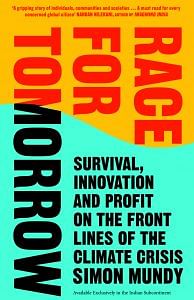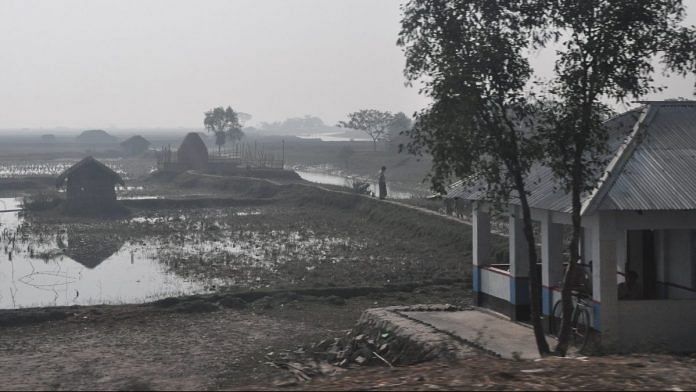Back in the southwestern delta, 25 miles northeast of Gabura, lies the port of Mongla, a rough-edged place with the feel of a frontier town, bisected by a river that can be crossed on wobbly wooden barges for three taka each way. Under searing sunshine I cross the river and jump onto a flat wooden pallet pulled by an electric cycle rickshaw, which halts after a few skull-juddering minutes outside the office of mayor Mohammad Zulfikar Ali.
It’s the mayor’s birthday and flowers are piling up on his desk alongside sugary rice cakes left by well-wishers. On the wall behind him, as required by government edict, are framed pictures of Prime Minister Sheikh Hasina and her father Mujibur Rahman, who led the country to independence from Pakistan in 1971. The picture of the prime minister is in excellent condition, I notice – unlike the one that Ali is accused of smashing, in a bizarre case making its way through the court system. He’s one of many opposition politicians facing criminal charges under the rule of Sheikh Hasina, who secured a third consecutive term six months earlier. Susannah Savage, a young Dhaka-based journalist who covered the election for the Financial Times, was one of several reporters targeted by Sheikh Hasina’s regime for highlighting the signs of massive fraud and voter intimidation behind that election result. Susannah told me she was detained by Bangladeshi intelligence and deported in handcuffs to the United Kingdom, having suffered physical abuse in custody including a heavy blow to the head. At the time of writing she was awaiting brain surgery in London. It was one of a mounting number of alleged acts of violence against journalists under Sheikh Hasina’s rule.
To the wider world, however, the kindly looking Sheikh Hasina has become known as a moral leader in the global conversation on climate change − a role she has played with aplomb, with impassioned calls to action at global conferences and in the op-ed pages of international newspapers. She’s in her second term as chair of the Climate Vulnerable Forum, representing forty-eight developing countries highly exposed to climate change, having picked up a UN Champion of the Earth award in New York along the way.
Also Read: Govt, media, opposition — Bangladesh can teach India how to handle hate crimes
While Sheikh Hasina’s government has been praised internationally for spending large sums on climate adaptation measures, it can be hard for opposition politicians like Ali to access the funds they need for their areas, he says. But with the support of a local ruling party lawmaker who’s now Sheikh Hasina’s deputy environment minister, he’s making progress on his vision for Mongla: to build the town into a climate-resilient new home for tens of thousands of southwestern Bangladeshis, offering them a new life in their home region instead of a risky plunge into the distant capital.
‘When I took over, there were children fishing in the streets,’ says Ali, a softly spoken man with bulldog jowls, who’s been Mongla’s mayor since 2011. To tackle the flooding from storm surges, he worked with the national government to raise $200 million from foreign agencies to build a 7-mile-long raised embankment. The project also installed sluice gates on the canals that criss-cross this area, to block the ingress of salty water at high tide.
While shoring up the town’s defences, Ali is eyeing an economic boom, driven in part by the tussle between Bangladesh’s two giant neighbours for influence over the country. China is providing nearly half the funding for a $550 million expansion of Mongla’s port. Over 100 acres of the town’s southern zone, meanwhile, is being turned into an entirely Indian industrial zone, with operations ranging from agri-processing to chemical production.
Also Read: Modi, Hasina must lay ground for borderless economy between India, Bangladesh
Ali expects Mongla’s population to double from its current level of 40,000 as the town’s economy grows, and as problems continue to mount in the countryside. But he’s determined to avoid replicating the situation in Dhaka. Mongla is the first town taking part in a new initiative from ICCCAD, the country’s leading climate change research institute. It’s aiming to help twenty towns and cities around the country to prepare for a surge in migration. Even if it’s too late to save the traditional livelihoods of millions of rural Bangladeshis, the scheme’s architects reason, they must be given options other than joining the unsustainable exodus to the Dhaka slums. In partnership with ICCCAD, Ali is building a plan to cater to the anticipated surge of new residents: safe, affordable housing with access to sanitation and clean water, as well as additional storm shelters for the cyclones that will become more fearsome as the ocean rises and warms.
In the afternoon, the mayor takes me for a walk along his prized embankment, an aide trotting alongside him with a parasol. Well paved and lined with slender young trees, it reminds me of riverside parks in more prosperous Asian cities like Seoul, except for the ducks and goats occasionally wandering onto it from adjacent homesteads. Animals are officially banned from the embankment, Ali says. ‘We just have to keep telling people again and again until they listen.
His mood blackens when we reach one of the new sluicegates installed across the town’s canals. Instead of holding back the influx of saline water from the high tide, the gate has been lashed open. After the countless accounts I’ve read and heard of shrimp farmers corruptly obstructing efforts to combat the region’s salinity crisis, this looks like another example. A small boy peers curiously from the other side of the sluicegate as its hapless overseer rushes to untie the ropes, under a torrent of fury from the mayor. ‘This is crazy,’ Ali mutters under his breath.
Also Read: Cyclone Amphan shows Bangladesh the cost of delaying a $38 billion delta management plan
 This excerpt from ‘Race For Tomorrow’ by Simon Mundy has been published with permission from Harper Collins India.
This excerpt from ‘Race For Tomorrow’ by Simon Mundy has been published with permission from Harper Collins India.



